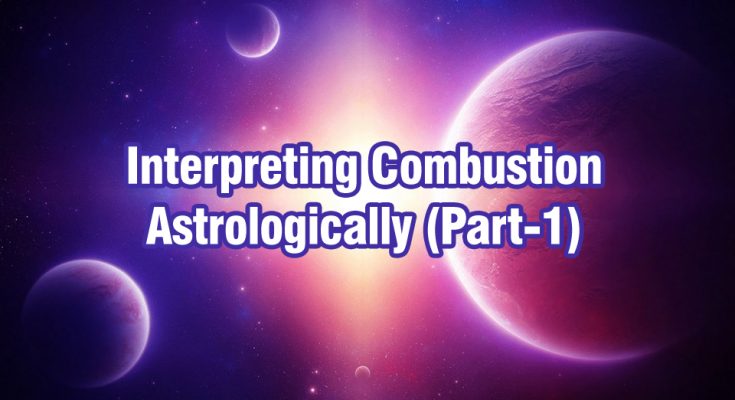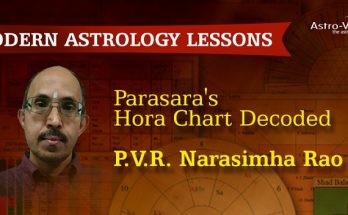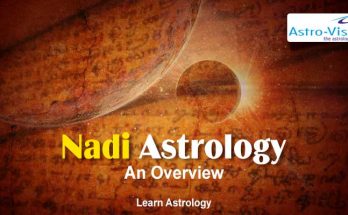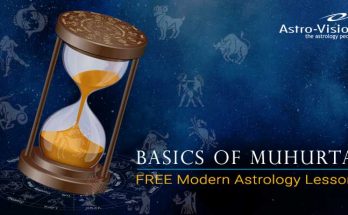The term combustion is used in both astrology as well as physics. In physics combustion is a property exhibited by fossil fuels such as coal and petroleum and in this process, they release energy. So it becomes a useful process as most of the energy requirements of the world are met through the property of combustion exhibited by fossil fuels. In astrology, the word combustion occurs as a diametrically opposite phenomenon, namely, the tendency of a planet to lose energy due to its proximity to the Sun. The combustion we learn in astrology is all about “Energy-depletion or the inability of a planet to release its energy and vitality to a horoscope “, mainly due to its proximity to the Sun. This is in contrast to the principle of combustion in Physics which is all about energy- generation . In astrology, combustion is all about wastage of planetary properties that renders it worthless whereas in Physics, combustion is all about utilization of latent resources, which make it worthwhile. I propose to dwell at length on the rules, exceptions, nuances and paradoxes relating to combustion, which hopefully would set at rest any doubts, both scholars and laymen would have on this less discussed subject.
Defining Combustion
Combustion is an astronomical phenomenon where a planet is supposed to come close to Sun, say within certain degrees.
The corollary of this phenomenon, which is what this dissertation is all about, is that a planet in combustion “loses its power to do good”. Does it lose all its power? Can this statement be modified to say, “a certain percentage of its power”? Is the combust planet supposed to confer only inauspicious results? These are some of the crucial questions that will be addressed, in the course of this article. While textbooks have chosen to maintain a dignified silence in respect of combustion, scholars have maintained a view similar to our saying “All is not lost” while adopting a liberal approach. A third category of astrologers has chosen to adopt the view, which is similar to Buddha’s middle path to Nirvana, while advocating the view that though, a combust planet is a “no-gooder” still it cannot be classified as a malefic. Which of these three conflicting views is correct?
Distance from Sun
A planet is supposed to be combust, according to Surya Siddhanta, when it is very close to the Sun, within a specified degree. A rider is also imposed stating that in retrogression Venus and Mercury are combust within a specified degree.
Table 2 : Combustion Orbit
In the case of the Nodes, Rahu and Ketu, one might say, that the rules of combustion do not apply but I am prepared to travel the extra mile to say that when Rahu or Ketu is in close proximity to the Sun, it is the latter which gets eclipsed! So a combust Rahu weakens the Sun and not the other way round!
Western astrology gives an allowance of 8° 30′ on either side of the Sun for a planet to become combust and in this process does not discriminate between the planets unlike in Vedic astrology’. According to Ptolemy, Father of Western Astrology, a combust planet tends to “impregnate” the Sun with its own qualities.
Mantreswara, in his Phaladeepika, puts forth the view that a combust planet is similar to one in debilitation as both are powerless (Chap. 20, Verse 30). Prof B. S. Rao in his path breaking commentary on Sarwartha Chintamani views the status of a planet in combustion, in debilitation and in an inimical house on similar lines. The principle of combustion is found to be applicable in the computation of longevity on quantitative lines found in textbooks on astrology. 50% of the quantum of years supplied by a planet is deducted for arriving at the longevity figure, while in combustion or debilitation, in Mantreswara’s approach while a liberalized approach is adopted by the author of Jataka Parijata in exempting Venus and Saturn from mandatory deductions. Some scholars have made an attempt to question the discriminatory approach in exempting Venus and Saturn from these deductions when all planets come under the phenomenon of combustion uniformly.
Cancellation of Combustion
The Sun is debilitated in Libra. If he conjoins Venus or Saturn he would get relief through the formation of a Neechabhanga Raja Yoga when the debilitated Sun conjoins either an exalted Saturn or a well-placed Venus in the latter’s own house in Libra. My humble view is that the exemption conferred upon Venus or Saturn bears a direct link to the Principle of Neechabhanga getting imported to combustion and resulting in Moudyabhanga or the concept of cancellation of combustion. If longevity is not affected merely because Saturn or Venus is combust, is there not a ground to infer that the Karakattwas of a combust planet are also not completely destroyed in this celestial phenomenon?
A new concept introduced by the author of Jataka Parijata is:
Planets which do not possess benefic aspect or other good influences prove to be inauspicious when they are debilitated, in inimical house, associated with malefics, combust, in junction points, have fewer points in Ashtakavarga or when they occupy the evil parts of a sign. (Chapter II, Sloka 34)
The correct interpretation of this verse would be a planet is deemed to be inauspicious if it:-
(a) Has some defect in the form of combustion or debilitation or any one of the negative features discussed in Verse 34 of Chapter II of Jataka Parijata.
(b) The aforesaid planet fails to obtain the aspect of a benefic.
The aspect of a benefic is curative in nature. One may even say it is preventive since it prevents the aforesaid weak planet from delivering bad results. In the absence of benefic aspect, the negative qualities of the planet are experienced by the native. Within the matrix of this doctrine there are certain exceptions.
(a)planet debilitated in both Rasi and in Navamsa gets the benefit of Vargottama and thereby is transformed into a benefic.
(b)A planet debilitated in Rasi but exalted in Navamsa acquires the status of an exalted planet (vide Jataka Parijata VI -36)
(c)A planet in debilitation is treated as an exalted planet while in retrogression. (Uttara Kalamrta II-6)
This verse incidentally gives rise to one of the factors causing Moudyabhanga (cancellation of combustion), namely, when a combust planet is aspected by a benefic, the evil attributable to combustion is removed.
Take for instance the Sun-Saturn conjunction in Aries. This is a perfect case of Neechabhanga Raja Yoga. A debilitated Saturn has its weakness covered up by an exalted Sun. In this case, if Saturn is also subject to combustion, then I would prefer to say it is not just Neechabhanga but also Moudyabhanga. In case this conjunction occurs in Libra, then one is faced with a piquant situation wherein a combust Saturn is aligned with a debilitated Sun.In this situation, I would go with the verdict that Moudyabhanga coexists with Neechabhanga in as much as a weak Sun is incapable of providing the required ammunition for combustion to immobilize a powerful Saturn.
According to Jataka Parijata,
A planet may be even badly placed or in an inimical Amsa or debilitated; it will nevertheless prove to be beneficial when the Navamsa or Rasi occupied it is its own or exaltation sign or of a friendly planet no less when a benefic aspect it (XI- 9)
This verse highlights the dictum that the Navamsa plays an important role in predictive astrology. If combustion is seen from this angle, then even a combust planet could provide good results provided it is well placed in Rasi or Navamsa. Adding to the ambiguity, textbooks on astrology fail to distinguish between an exalted combust planet and a combust debilitated planet. The Sun-Jupiter conjunction in Cancer cannot be equated with the Sun-Jupiter conjunction in Capricorn. In the former case, both planets occupy a state of dignity. In the latter case, Sun occupies the house of his dire enemy Saturn, while Jupiter is debilitated. In that situation one cannot expect either of the planets to individually deliver positive results, let alone the prospects of this Yoga.
Can Mercury get Combust ?
The Budha-Aditya Yoga is extolled in ancient texts. Polite speech, fame, respect of the rulers, greatness, wealth, happiness and beauty all follow a person who has Budha Aditya Yoga in the natal chart. What if under the given circumstance, Mercury is combust? Some scholars opine that a combust Mercury cannot give rise to Budha Aditya Yoga. The sine quo non for occurrence of the Budha Aditya Yoga is a non-combust Mercury. A certain section of scholars holds the view that the word “Yoga” does not differentiate rapt conjunction from conjunction in the sense in which it is ordinarily understood. For a conjunction to take place all that is needed is for the two planets – Sun and Mercury – to occupy the same sign. Using this argument this school holds the view that combustion of Mercury is negated by occurrence of Budha-Aditya Yoga. In its view, Mercury can never suffer the blemish of combustion.
Yoga Bhanga Factor
Pravrajya or Sanyasa Yoga is generally considered an inauspicious Yoga wherein a person renounces his routine life to take up the life of a mendicant. While the quest for spiritual realization is a goal common to all of mankind, what renders Pravrajya Yoga inauspicious is the fact that the native is denied the happiness associated with family and belongings. In the process of reaching Moksha, Artha (wealth) and Kama (pleasure) are not just intermediary stages, but an essential part of the preparatory journey — without partaking the legitimate quota of mundane pleasures, the human birth is rendered infructuous. Self-realization is the ultimate quest of all mankind but nor without the allowances for wealth or pleasures. It is the deprivation of all forms of mundane happiness that makes Pravrajya, a not-so alluring prospect even for a spiritual aspirant.
You can look at Pravrajya Bhanga Yoga due to a combust planet from two angles. By denying access to mendicancy, it can effectively scuttle the prospects of asceticism. The fallout of this is that it makes a person a spiritual aspirant within the framework of a family thereby leading to krama mukti or salvation in a progressive way.When found in the chart of a householder (Grihasta), it makes him a detached witness to family life but does not permit him to shirk the duties attendant on the breadwinner of a family. Pravrajya Yoga can help identify a person who is best suited for heading Ashrams, hermitages or Mutts but in case one of the planets giving rise to this Yoga is combust, then the person merely has admiration for ascetism but does not become an ascetic himself. Not every fan of Sachin Tendulkar is a cricketer. Some have aptitude and training for playing the game while others have a passion for the sport though they may not have held a cricket bat in their hand all through their lives. This analogy would explain the dichotomy between Pravrajya Yoga and Pravrajyabhanga Yoga (I am using the term “Pravrajyabhanga Yoga” for want of better terminology).
Bhattotpala gives a clue to determining whether a planet is combust or not. Assuming that a planet occupies the 2nd house from the Sun does not mean it is not combust nor does the Yoga of a planet in conjunction with the Sun automatically make it combust. The mathematical degrees alone are the guiding principle to ascertain whether a planet is combust or not.
“In the examination of hundreds of horoscopes I have found the Yogas per se valid for what results are predicted .Combustion does its work independently of the Yogas of course one swallow does never make a summer – a thousand might. Our difficulty is that in the thousand not one is the same absolutely as another. Therefore, we ought to look for variations and figure out how and the why on scientific lines, not philosophic. The effect of combustion then is always felt and seen. But Yogas are not captives of the combustion principle. The founding fathers must at least be credited with the knowledge that certain planets in their Yoga formulations are vulnerable to combustion. We find no qualifying clauses in the stipulation of such Yogas. After a careful and close scrutiny of the relevant horoscopes I have come to the conclusion that conjunction with the Sun does not deprive a planet of his Yoga-forming powers. Its disadvantages would come to be expressed in other aspects of his functioning. (Y. Keshava Menon, The A.M., Sep. 1971, page 699)
Courtesy: Modern Astrology (Dr. E.S Neelakantan Ph.D)
To be continued…











One Comment on “Interpreting Combustion Astrologically (Part – 1)”